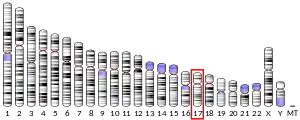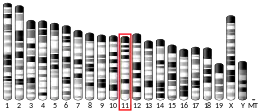| SMARCE1 | |||||||||||||||||||||||||||||||||||||||||||||||||||
|---|---|---|---|---|---|---|---|---|---|---|---|---|---|---|---|---|---|---|---|---|---|---|---|---|---|---|---|---|---|---|---|---|---|---|---|---|---|---|---|---|---|---|---|---|---|---|---|---|---|---|---|
| Identifiers | |||||||||||||||||||||||||||||||||||||||||||||||||||
| Aliases | SMARCE1, BAF57, CSS5, SWI/SNF related, matrix associated, actin dependent regulator of chromatin, subfamily e, member 1 | ||||||||||||||||||||||||||||||||||||||||||||||||||
| External IDs | OMIM: 603111 MGI: 1927347 HomoloGene: 37727 GeneCards: SMARCE1 | ||||||||||||||||||||||||||||||||||||||||||||||||||
| |||||||||||||||||||||||||||||||||||||||||||||||||||
| |||||||||||||||||||||||||||||||||||||||||||||||||||
| |||||||||||||||||||||||||||||||||||||||||||||||||||
| |||||||||||||||||||||||||||||||||||||||||||||||||||
| Wikidata | |||||||||||||||||||||||||||||||||||||||||||||||||||
| |||||||||||||||||||||||||||||||||||||||||||||||||||
SWI/SNF-related matrix-associated actin-dependent regulator of chromatin subfamily E member 1 is a protein that in humans is encoded by the SMARCE1 gene.[5][6]
Function
The protein encoded by this gene is part of the large ATP-dependent chromatin remodeling complex SWI/SNF, which is required for transcriptional activation of genes normally repressed by chromatin. The encoded protein, either alone or when in the SWI/SNF complex, can bind to 4-way junction DNA, which is thought to mimic the topology of DNA as it enters or exits the nucleosome. The protein contains a DNA-binding HMG domain, but disruption of this domain does not abolish the DNA-binding or nucleosome-displacement activities of the SWI/SNF complex. Unlike most of the SWI/SNF complex proteins, this protein has no yeast counterpart.[6]
Interactions
SMARCE1 has been shown to interact with Estrogen receptor alpha,[7] SMARCB1[8][9] and SMARCA4.[8][9]
References
- 1 2 3 GRCh38: Ensembl release 89: ENSG00000073584 - Ensembl, May 2017
- 1 2 3 GRCm38: Ensembl release 89: ENSMUSG00000037935 - Ensembl, May 2017
- ↑ "Human PubMed Reference:". National Center for Biotechnology Information, U.S. National Library of Medicine.
- ↑ "Mouse PubMed Reference:". National Center for Biotechnology Information, U.S. National Library of Medicine.
- ↑ Wang W, Chi T, Xue Y, Zhou S, Kuo A, Crabtree GR (Jan 1998). "Architectural DNA binding by a high-mobility-group/kinesin-like subunit in mammalian SWI/SNF-related complexes". Proceedings of the National Academy of Sciences of the United States of America. 95 (2): 492–8. Bibcode:1998PNAS...95..492W. doi:10.1073/pnas.95.2.492. PMC 18447. PMID 9435219.
- 1 2 "Entrez Gene: SMARCE1 SWI/SNF related, matrix associated, actin dependent regulator of chromatin, subfamily e, member 1".
- ↑ Belandia B, Orford RL, Hurst HC, Parker MG (Aug 2002). "Targeting of SWI/SNF chromatin remodelling complexes to estrogen-responsive genes". The EMBO Journal. 21 (15): 4094–103. doi:10.1093/emboj/cdf412. PMC 126156. PMID 12145209.
- 1 2 Wang W, Côté J, Xue Y, Zhou S, Khavari PA, Biggar SR, Muchardt C, Kalpana GV, Goff SP, Yaniv M, Workman JL, Crabtree GR (Oct 1996). "Purification and biochemical heterogeneity of the mammalian SWI-SNF complex". The EMBO Journal. 15 (19): 5370–82. doi:10.1002/j.1460-2075.1996.tb00921.x. PMC 452280. PMID 8895581.
- 1 2 Zhao K, Wang W, Rando OJ, Xue Y, Swiderek K, Kuo A, Crabtree GR (Nov 1998). "Rapid and phosphoinositol-dependent binding of the SWI/SNF-like BAF complex to chromatin after T lymphocyte receptor signaling". Cell. 95 (5): 625–36. doi:10.1016/S0092-8674(00)81633-5. PMID 9845365. S2CID 3184211.
Further reading
- Martens JA, Winston F (Apr 2003). "Recent advances in understanding chromatin remodeling by Swi/Snf complexes". Current Opinion in Genetics & Development. 13 (2): 136–42. doi:10.1016/S0959-437X(03)00022-4. PMID 12672490.
- Wang W, Côté J, Xue Y, Zhou S, Khavari PA, Biggar SR, Muchardt C, Kalpana GV, Goff SP, Yaniv M, Workman JL, Crabtree GR (Oct 1996). "Purification and biochemical heterogeneity of the mammalian SWI-SNF complex". The EMBO Journal. 15 (19): 5370–82. doi:10.1002/j.1460-2075.1996.tb00921.x. PMC 452280. PMID 8895581.
- Cho H, Orphanides G, Sun X, Yang XJ, Ogryzko V, Lees E, Nakatani Y, Reinberg D (Sep 1998). "A human RNA polymerase II complex containing factors that modify chromatin structure". Molecular and Cellular Biology. 18 (9): 5355–63. doi:10.1128/MCB.18.9.5355. PMC 109120. PMID 9710619.
- Phelan ML, Sif S, Narlikar GJ, Kingston RE (Feb 1999). "Reconstitution of a core chromatin remodeling complex from SWI/SNF subunits". Molecular Cell. 3 (2): 247–53. doi:10.1016/S1097-2765(00)80315-9. PMID 10078207.
- Xue Y, Canman JC, Lee CS, Nie Z, Yang D, Moreno GT, Young MK, Salmon ED, Wang W (Nov 2000). "The human SWI/SNF-B chromatin-remodeling complex is related to yeast rsc and localizes at kinetochores of mitotic chromosomes". Proceedings of the National Academy of Sciences of the United States of America. 97 (24): 13015–20. Bibcode:2000PNAS...9713015X. doi:10.1073/pnas.240208597. PMC 27170. PMID 11078522.
- Decristofaro MF, Betz BL, Rorie CJ, Reisman DN, Wang W, Weissman BE (Jan 2001). "Characterization of SWI/SNF protein expression in human breast cancer cell lines and other malignancies". Journal of Cellular Physiology. 186 (1): 136–45. doi:10.1002/1097-4652(200101)186:1<136::AID-JCP1010>3.0.CO;2-4. PMID 11147808. S2CID 25016283.
- Simpson JC, Wellenreuther R, Poustka A, Pepperkok R, Wiemann S (Sep 2000). "Systematic subcellular localization of novel proteins identified by large-scale cDNA sequencing". EMBO Reports. 1 (3): 287–92. doi:10.1093/embo-reports/kvd058. PMC 1083732. PMID 11256614.
- Kato H, Tjernberg A, Zhang W, Krutchinsky AN, An W, Takeuchi T, Ohtsuki Y, Sugano S, de Bruijn DR, Chait BT, Roeder RG (Feb 2002). "SYT associates with human SNF/SWI complexes and the C-terminal region of its fusion partner SSX1 targets histones". The Journal of Biological Chemistry. 277 (7): 5498–505. doi:10.1074/jbc.M108702200. hdl:2066/170683. PMID 11734557.
- Chi TH, Wan M, Zhao K, Taniuchi I, Chen L, Littman DR, Crabtree GR (Jul 2002). "Reciprocal regulation of CD4/CD8 expression by SWI/SNF-like BAF complexes". Nature. 418 (6894): 195–9. doi:10.1038/nature00876. PMID 12110891. S2CID 4406140.
- Belandia B, Orford RL, Hurst HC, Parker MG (Aug 2002). "Targeting of SWI/SNF chromatin remodelling complexes to estrogen-responsive genes". The EMBO Journal. 21 (15): 4094–103. doi:10.1093/emboj/cdf412. PMC 126156. PMID 12145209.
- Battaglioli E, Andrés ME, Rose DW, Chenoweth JG, Rosenfeld MG, Anderson ME, Mandel G (Oct 2002). "REST repression of neuronal genes requires components of the hSWI.SNF complex". The Journal of Biological Chemistry. 277 (43): 41038–45. doi:10.1074/jbc.M205691200. PMID 12192000.
- Baker KM, Wei G, Schaffner AE, Ostrowski MC (May 2003). "Ets-2 and components of mammalian SWI/SNF form a repressor complex that negatively regulates the BRCA1 promoter". The Journal of Biological Chemistry. 278 (20): 17876–84. doi:10.1074/jbc.M209480200. PMID 12637547.
- Kitagawa H, Fujiki R, Yoshimura K, Mezaki Y, Uematsu Y, Matsui D, Ogawa S, Unno K, Okubo M, Tokita A, Nakagawa T, Ito T, Ishimi Y, Nagasawa H, Matsumoto T, Yanagisawa J, Kato S (Jun 2003). "The chromatin-remodeling complex WINAC targets a nuclear receptor to promoters and is impaired in Williams syndrome". Cell. 113 (7): 905–17. doi:10.1016/S0092-8674(03)00436-7. PMID 12837248.
- Hsiao PW, Fryer CJ, Trotter KW, Wang W, Archer TK (Sep 2003). "BAF60a mediates critical interactions between nuclear receptors and the BRG1 chromatin-remodeling complex for transactivation". Molecular and Cellular Biology. 23 (17): 6210–20. doi:10.1128/MCB.23.17.6210-6220.2003. PMC 180928. PMID 12917342.
- Wu K, Bottazzi ME, de la Fuente C, Deng L, Gitlin SD, Maddukuri A, Dadgar S, Li H, Vertes A, Pumfery A, Kashanchi F (Jan 2004). "Protein profile of tax-associated complexes". The Journal of Biological Chemistry. 279 (1): 495–508. doi:10.1074/jbc.M310069200. PMID 14530271.
- Millar JK, Christie S, Porteous DJ (Nov 2003). "Yeast two-hybrid screens implicate DISC1 in brain development and function". Biochemical and Biophysical Research Communications. 311 (4): 1019–25. doi:10.1016/j.bbrc.2003.10.101. PMID 14623284.



